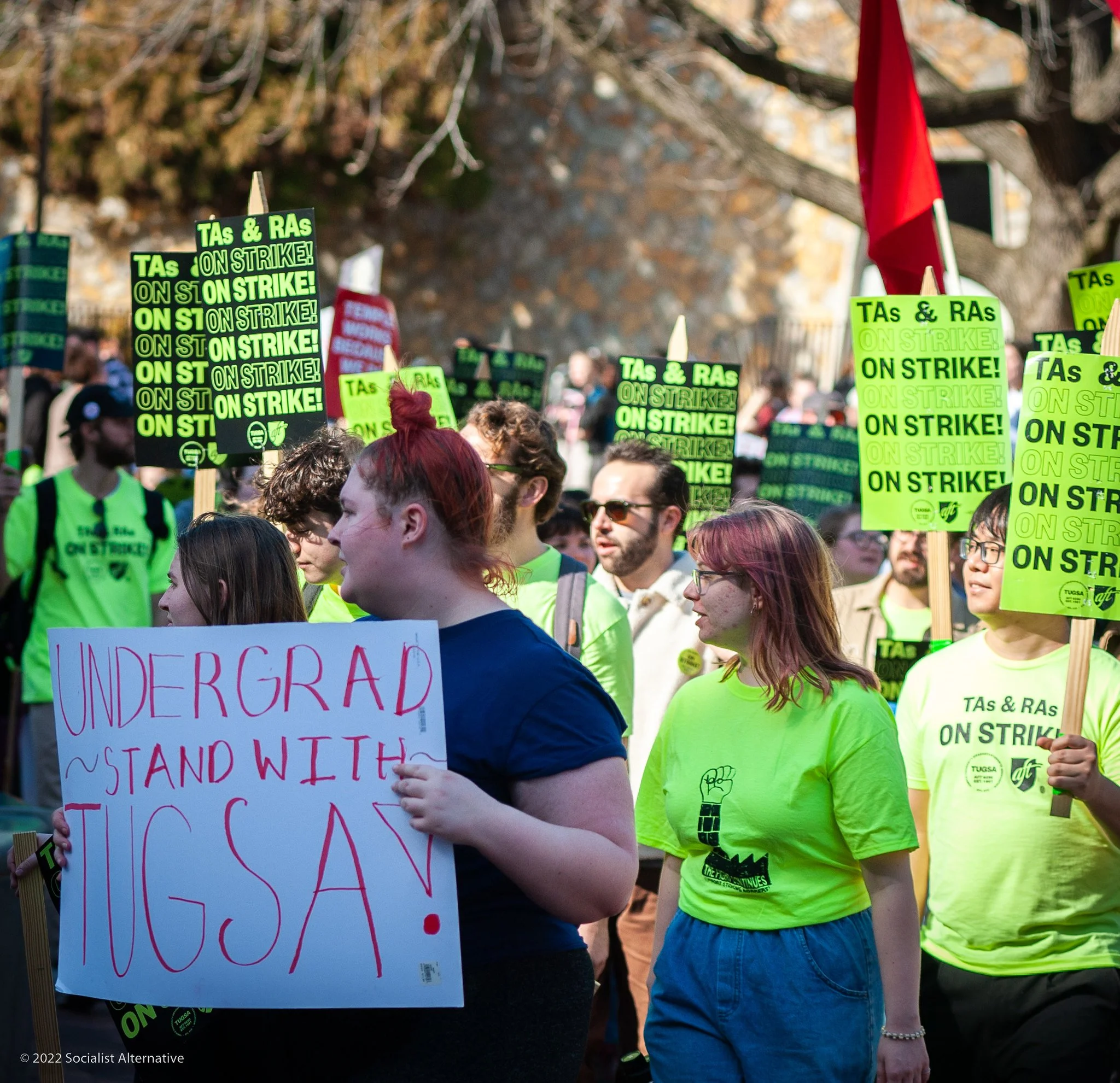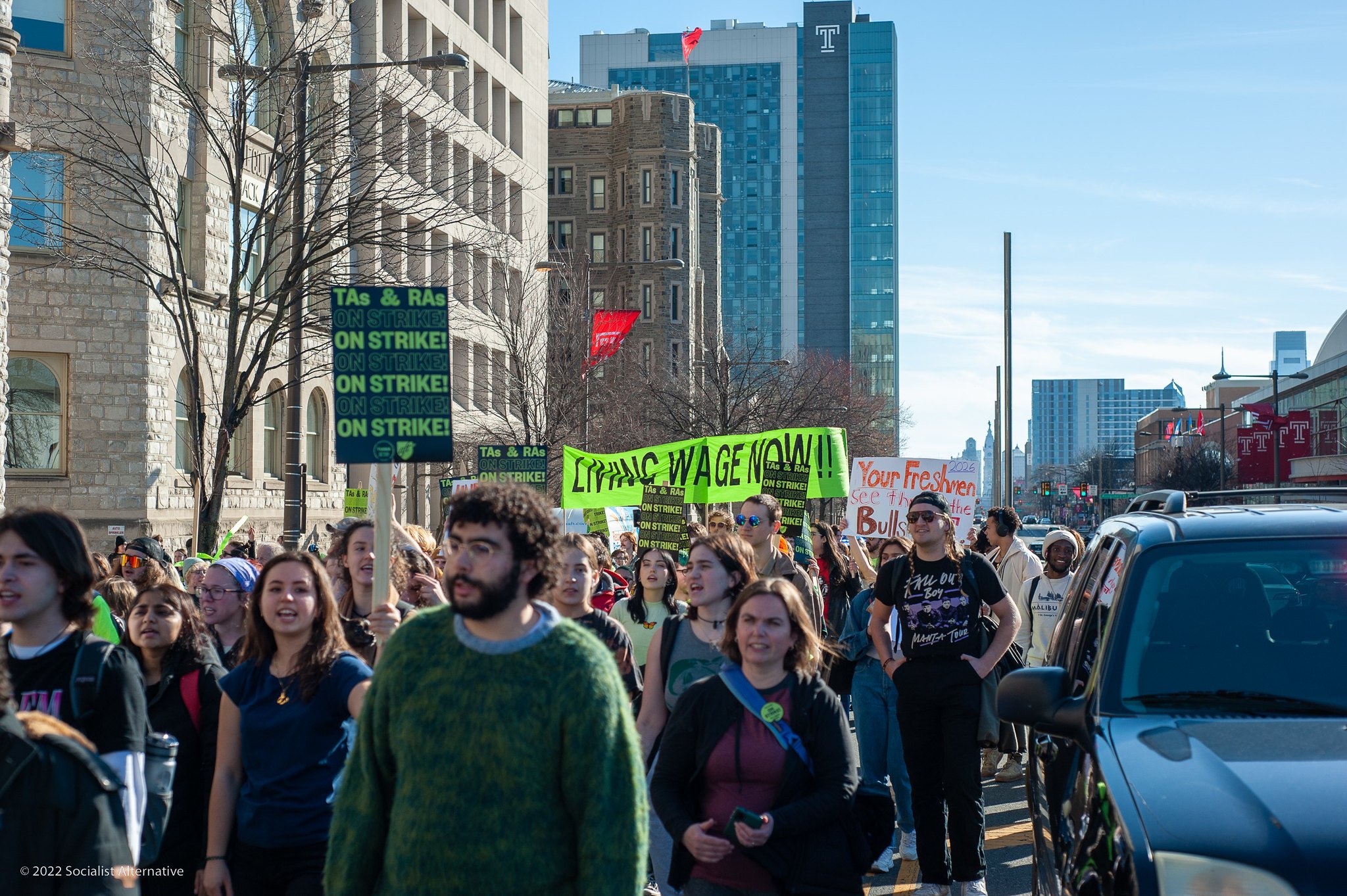Temple grad workers’ strike at a crossroads — what next?
By Jesada Jitpraphakhan and Anna Barnett, Workers Strike Back. Published February 20, 2023
After 18 days on strike, TUGSA, the union representing graduate student workers at Temple University, has reported reaching a tentative agreement with the administration. Their strike comes after over a year of dead-end negotiations. Temple teaching and research assistants are paid $19,500 on average, an unlivable wage in Philadelphia, especially in today’s worsening cost of living crisis, and TUGSA has been demanding a base wage of $32,800 as well as dependent healthcare, increased parental and bereavement leave, and policies to address overwork. They deserve nothing less.
While the Philadelphia Inquirer was quick to publish that “Temple graduate students' strike ends, tentative agreement reached” (a headline later changed), TUGSA stated in no uncertain terms that the strike was not over and would continue until an agreement was ratified by the members. This is absolutely the correct way to conduct a TA ratification vote. Many other union leaderships have put their thumb on the scale by calling off the picket lines or even sending members back to work while voting on TAs. This is an important opportunity for TUGSA members to weigh up the TA, and discuss together on the picket lines what would be necessary to escalate the strike in the event members vote "no".
Over the course of the strike, TUGSA members have made tremendous sacrifices, with the confidence that a powerful strike would force the administration to concede to a strong contract. While the details of the TA are not yet shared publicly, if it does measure up to the demands of the union, it will be a testament to TUGSA’s fighting approach and the groundswell of support on campus, not to any good will on Temple’s part. But if it turns out to fall short of what members want and are willing to fight for, the good news is there is momentum on the side of the union and a path forward to fight for more.
While Temple’s brutal retaliation was designed to demoralize workers, and it’s understandable that many feel anxious to get back to their students and research, there has been a mood amongst workers throughout the strike that they can’t afford to make significant concessions on their demands. During the UC strike, the UAW leadership took the mistaken approach of going into a strike with the intention of making concessions to resolve things as quickly as possible.
If there is still a strong desire to fight for more among TUGSA members, it would be a mistake to accept a bad deal prematurely. However, if members vote “no” on the TA, it will be necessary to escalate the struggle in order to win something better. This will require uniting with other unions and students to completely shut down business-as-usual for Temple admins and their corporate colleagues.
Temple’s Shock-and-Awe Retaliation
From the outset, TUGSA has been very clear to call out Temple as their class enemy, who hikes tuition and spends millions on real estate investment, but refuses to cough up the money to pay grad workers a living wage. A week into the strike, and desperate to stamp out the flames early, Temple escalated brutally, slashing strikers’ health insurance coverage and revoking their tuition remission for the semester.
These were unprecedented attacks, rarely actually carried out by universities during strikes, showing that Temple wanted to bring the strike to a swift conclusion on their terms. Grad workers are certainly suffering as a result, but Temple’s actions have also been a serious overreach, further polarizing much of the school community against the administration and rallying more support from outside. TUGSA even reported that more workers joined the strike in anger and disgust.
Temple also moved quickly to replace striking TAs with scabs, offering them $23,000 for a semester - more than the TA’s make in a year! Administration claims to have students’ academic progress in mind, but it's clear that they've been more concerned with breaking the union than facilitating good education for students.
Undergrads Show the Way Forward with 1000-Strong Walkout and Rally
Just two days before the TA was reached, undergraduate students organized a 1000-strong walkout on campus on 2/15, with a rally, march, and open mic speakout in support of striking TAs and RAs. This day of action, the largest since the start of the strike, was a clear demonstration of the potential that exists among the student body, most of whom support the strike, but until that point had no clear direction with which to make their support concrete.
The action was built in just over a week, after a packed meeting of undergrads, called by Socialist Alternative and Workers Strike Back, voted unanimously to build for a walkout and rally. Immediately, the initiative picked up serious momentum, with scores of students organizing in group chats, making appeals to classmates to walkout, passing out thousands of flyers, and papering every dorm room with walkout information.
Less than 48 hours after students began organizing, Temple administration had already responded, attempting to scare students into not participating in the day of action and pitting undergrads against graduate workers. Largely, this backfired, showing that when we fight back, it puts the boss under pressure, and they can make tactical mistakes. The walkout received free publicity delivered to the inbox of every undergrad, and most students saw right through Temple’s smokescreen, understanding that the school could restore classes to normal by simply paying TA’s and RA’s what they demand.
The day of action was also taken up by grad students and other academic workers across the country at Columbia, NYU, CUNY, University of Washington, Northwestern and more, who organized their own walkouts or other demonstrations of solidarity with TUGSA. Most significantly, it points the way forward towards the types of actions that will be needed if TUGSA members want to keep fighting for a better deal.
If Workers Reject the TA, What Strategy Could Win More?
If the TA falls short of what workers think can be won, voting “no” can’t just mean sending the negotiating team back to the table, but must be tied to a clear strategy to escalate the strike to win more. While legal challenges can appear to open up a new front of struggle against the boss, the legal system is ultimately designed to be a pressure relief valve which diverts mass struggle and channels it into the hands of the courts. Progress made thus far has been a result of an energetic strike that’s polarized the campus and disrupted business as usual.
TUGSA members have made it clear they’re striking to win, which means they’ve been prepared for a long strike if necessary. But while the pressure exerted by the strike can build as grade submission time rolls around, the length of the strike does not necessarily correlate with its power, especially as the university continues to ramp up intimidation and fills TA positions with scab workers.
In a war of attrition, where workers struggling to get by try to outlast wealthy institutions, the boss will often succeed, unless workers continue to escalate the crisis that the boss faces. Many grad student workers recognize that their strike does not immediately stop the flow of profits to the university. That’s why broadening the scope of the strike is so necessary to create a more decisive crisis for the administration, rather than attempting to wait them out. For TUGSA, this means winning over the vast majority of Temple workers and students to a position of active support.
If workers decide to vote “no” on this TA and extend the strike, the strike must be used as a recruitment tool to the union. To strengthen their position, TUGSA will need to keep organizing new workers into the union and bring union members who aren’t striking onto the picket line, especially in departments where the union is weaker. A strong strike with a fighting approach is the best tool to overcome the fear and misinformation inflamed by Temple’s threats and convince workers to join the union and the strike. This kind of momentum won’t automatically develop over time, but needs to be consciously built by winning active solidarity from across the campus.
Broaden the Strike: Shut Down the Whole University
The 2/15 walkout set an example for the type of action needed and huge potential still exists to continue building support among undergraduate students and workers. Passive supporters can be actively brought into the fight and thousands of others who are on the fence, or have been impacted by administration’s lies, could be convinced to join the side of the strikers.
To win more, we need to build a massive, coordinated day of action to shut down the whole university. This campus-wide shutdown would need to be consciously built ahead of time and widely publicized, as the student strike was. While many Temple workers do support the TUGSA strike, this support needs to be focused and mobilized into forcing Temple admins to back down.
We know this support exists. Teamsters Local 623 representing UPS drivers has been honoring TUGSA’s picket line, halting package deliveries to Temple University. This is exactly the kind of broadening out of the strike through concrete solidarity that must be replicated amongst all sections of workers that work at or interact with Temple, in order to exert maximum pressure on Temple administration.
There are lots of other unions at Temple who will benefit in their next round of bargaining if TUGSA wins their key demands. Many workers, especially professors, have been correctly doing what they can within the letter of the law to support, including canceling class or not taking attendance during the undergrad walkout. Unions would need to back up these commendable acts of solidarity, even if some of them mistakenly accepted anti-solidarity clauses in their contracts. This could happen in the form of mass sickouts, or even well-timed ULP (unfair labor practice) actions over specific workplace issues that are technically unrelated to the TUGSA strike.
A single day of action with not just thousands of students boycotting their classes, but all Temple workers joining in to shut down campus with the biggest picket line in Temple history, would cause the university to seize and create a crisis for the administration. No classes would be in session, no vending would take place in campus buildings, and no student services would operate.
If TUGSA wins a contract that meets their demands, it will embolden professors, counselors, security guards, dining hall workers, and undergrad student workers to fight for more. Temple’s fierce opposition has always stemmed not from financial concerns, but from an understanding of the dangerous precedent a victory could set across their campus. Beyond Temple University this strike has been a point of reference for many workers across the city and country who understand the outcome will have an impact on the boldness of future contract fights and organizing drives. We stand with workers in the struggle for the strongest possible contract and are prepared to continue fighting alongside TUGSA members if this TA does not measure up to what they think can be won. A victory at Temple would mean a victory for workers and a defeat for bosses everywhere.


